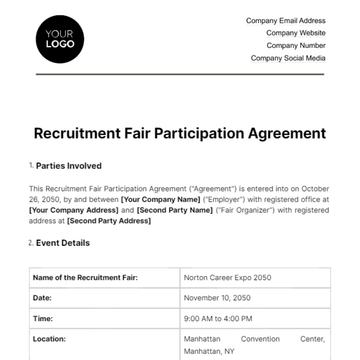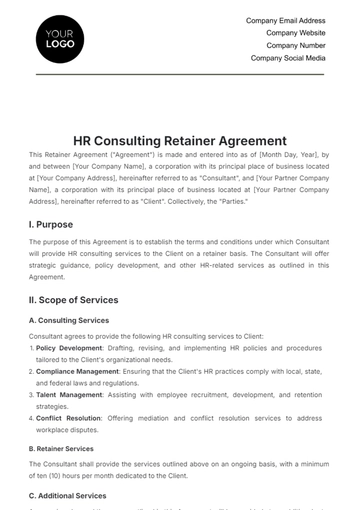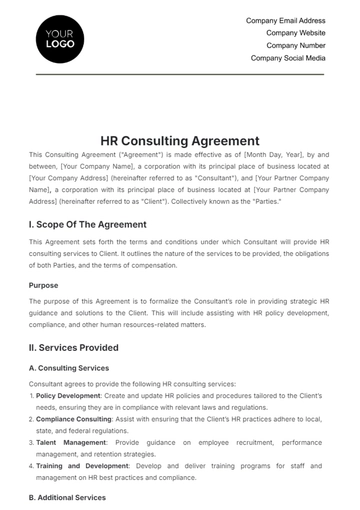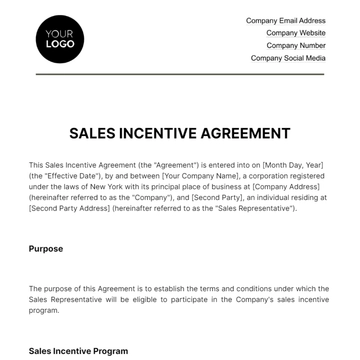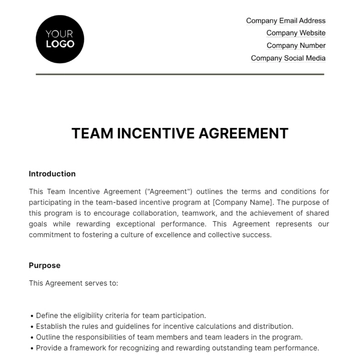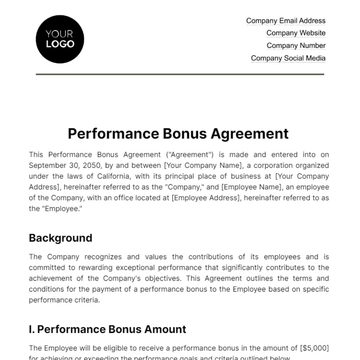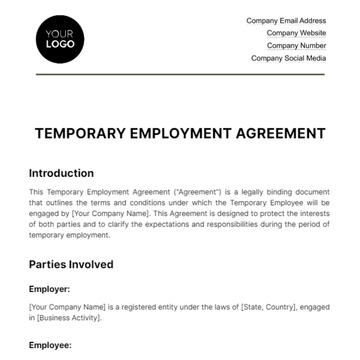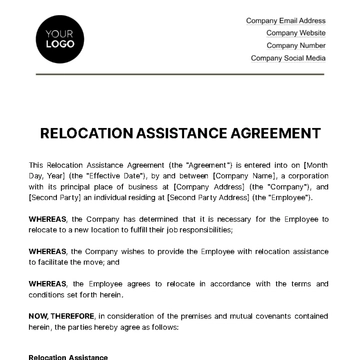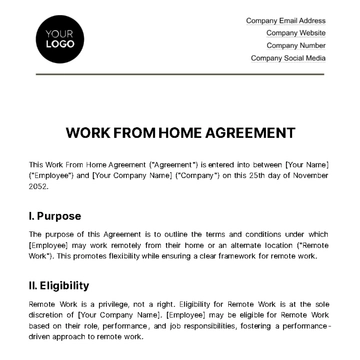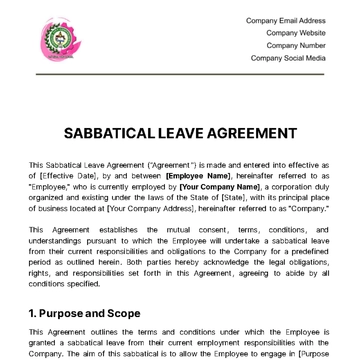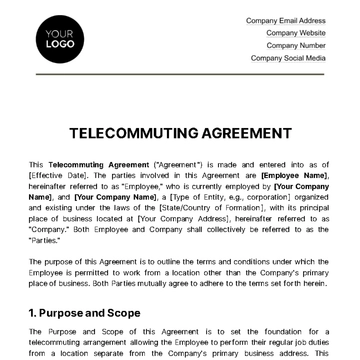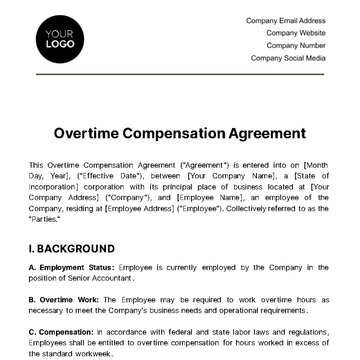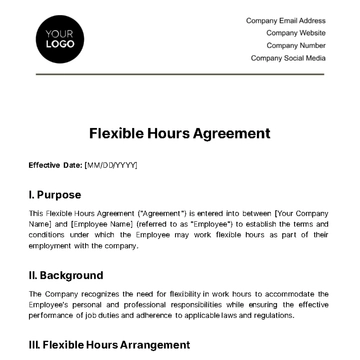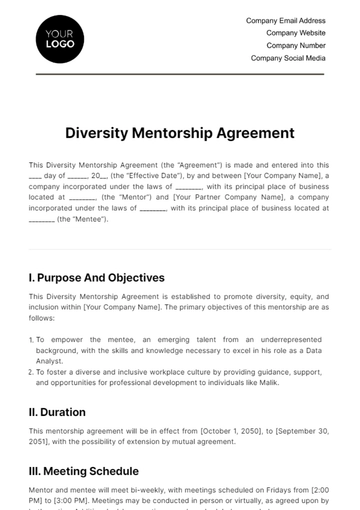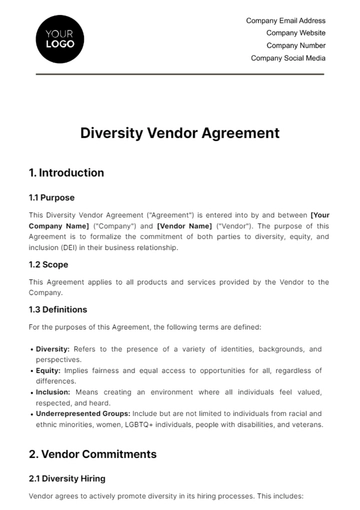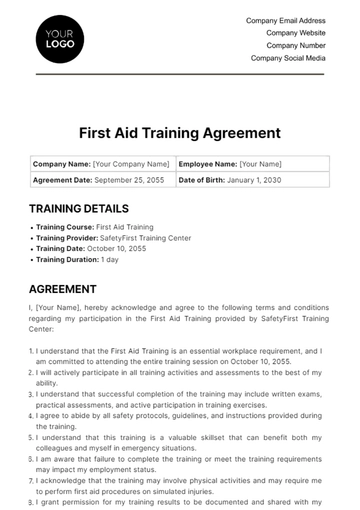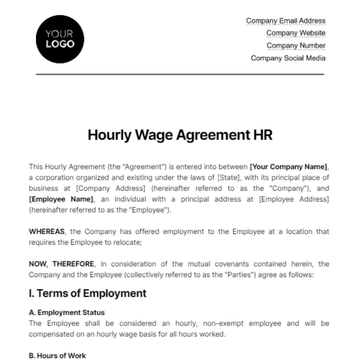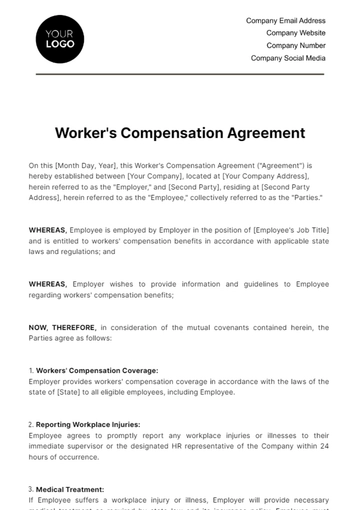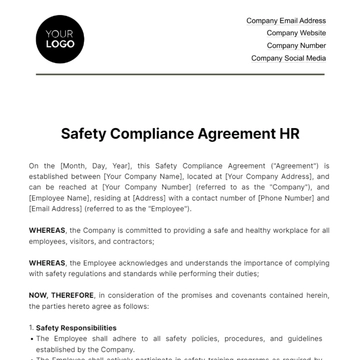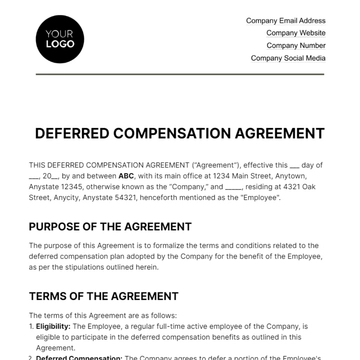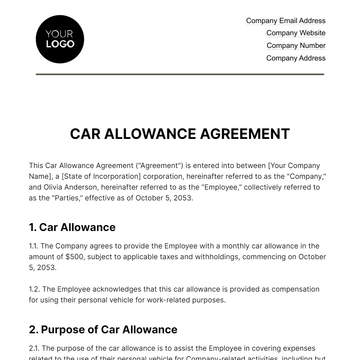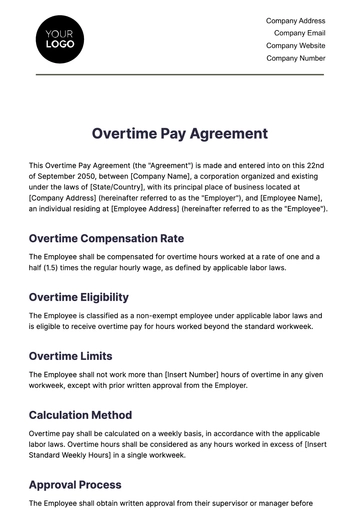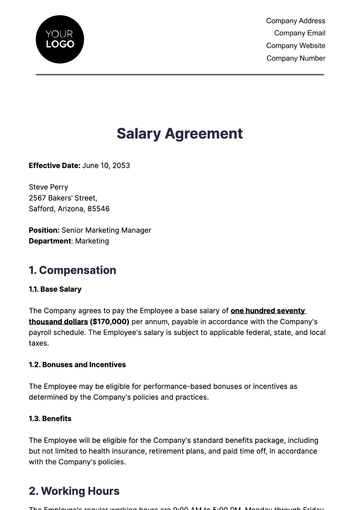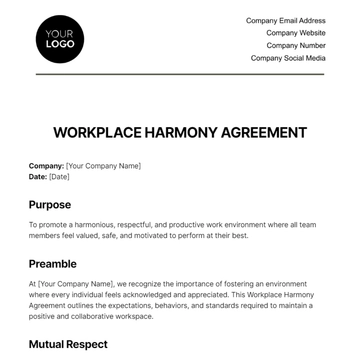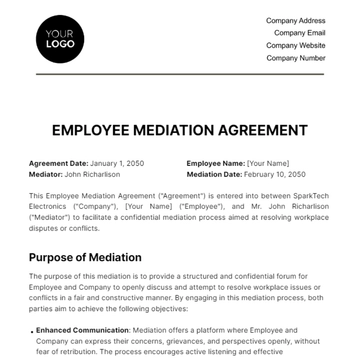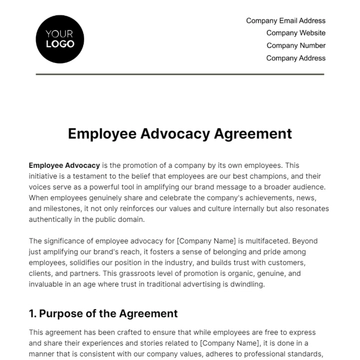Free Employee Advocacy Agreement HR
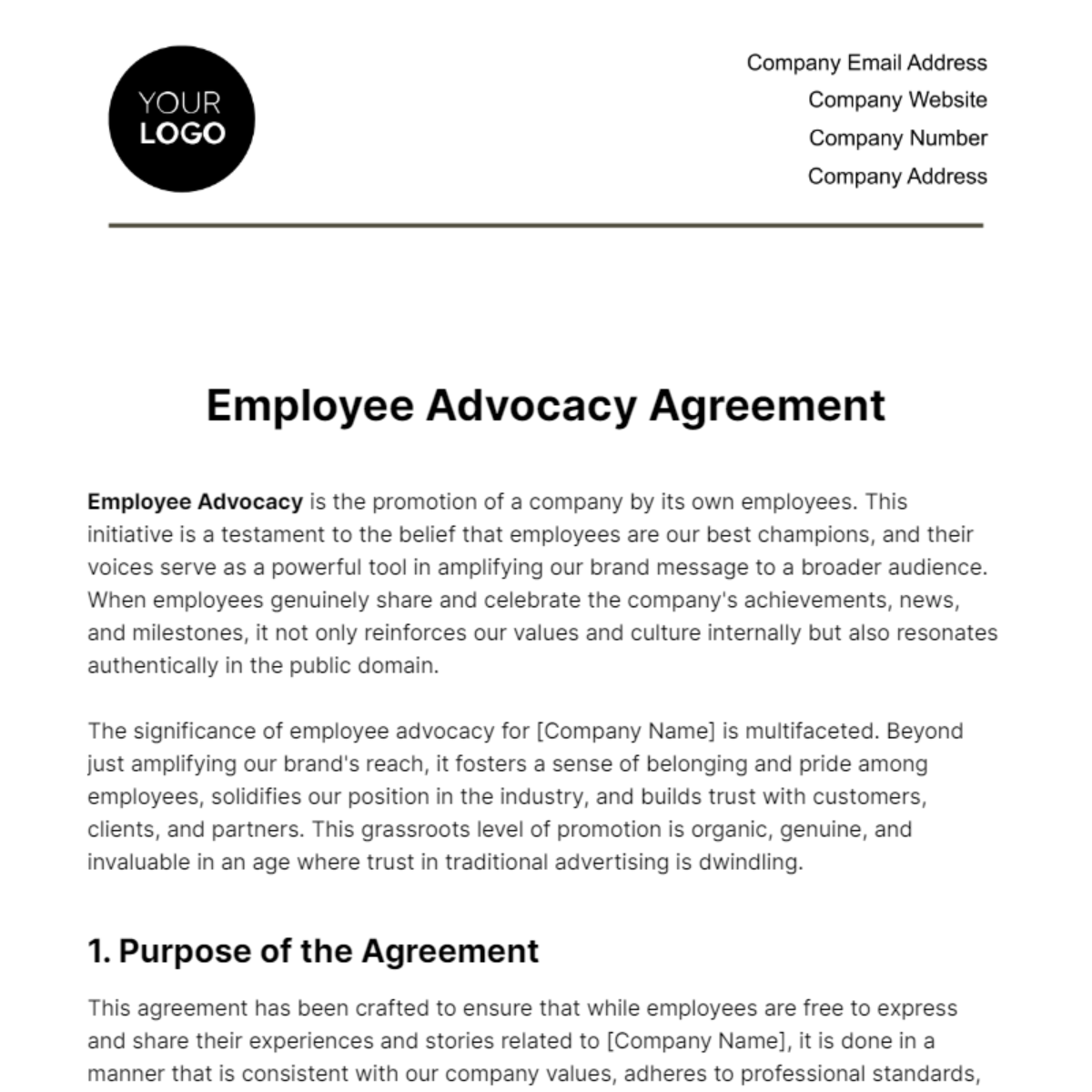
Employee Advocacy is the promotion of a company by its own employees. This initiative is a testament to the belief that employees are our best champions, and their voices serve as a powerful tool in amplifying our brand message to a broader audience. When employees genuinely share and celebrate the company's achievements, news, and milestones, it not only reinforces our values and culture internally but also resonates authentically in the public domain.
The significance of employee advocacy for [Company Name] is multifaceted. Beyond just amplifying our brand's reach, it fosters a sense of belonging and pride among employees, solidifies our position in the industry, and builds trust with customers, clients, and partners. This grassroots level of promotion is organic, genuine, and invaluable in an age where trust in traditional advertising is dwindling.
1. Purpose of the Agreement
This agreement has been crafted to ensure that while employees are free to express and share their experiences and stories related to [Company Name], it is done in a manner that is consistent with our company values, adheres to professional standards, and maintains the confidentiality and proprietary nature of internal information.
It's crucial for both the reputation of [Company Name] and the employees themselves that company-related communications, especially in public forums, are accurate, respectful, and constructive. This agreement delineates the guidelines for such communications, ensuring that while we celebrate our achievements and address challenges, we do so in a manner that upholds the integrity and reputation of [Company Name].
2. Guidelines for Advocacy
Being an advocate for [Company Name] is both a privilege and responsibility. It offers an opportunity to enhance the company's reputation while also potentially furthering individual professional credibility. Here are the essential guidelines that every employee advocate should adhere to:
Authenticity and Transparency: Your audience values sincerity. Always speak from genuine experiences, beliefs, and understanding. If sharing about a challenge, be open about the steps being taken to resolve it.
Confidentiality and Proprietary Information: Avoid discussing or sharing information that hasn't been publicly disclosed by [Company Name]. This includes, but is not limited to, financial data, strategic plans, unannounced products or services, and internal communications.
Accuracy of Information: Always double-check facts before sharing. Misinformation, even if unintentional, can harm the company's reputation and mislead audiences.
Respectfulness and Professionalism: Engage in discussions with the same respect and courtesy you would expect in return. Avoid confrontational or aggressive behaviors and always uphold the company's values in every interaction.
Dos and Don'ts
|
|
3. Training and Resources
At [Company Name], we believe in empowering our employees to become confident and informed advocates. Recognizing the need for proper guidance, we have instituted the following support mechanisms:
Training Sessions: Periodic training sessions will be held to ensure employees understand the guidelines, strategies, and best practices of advocacy. These will also serve as refresher courses and forums for discussing new trends in advocacy.
Digital Toolkits: A digital toolkit will be made available to all employee advocates. This will include ready-to-share content, frequently asked questions, templates, and branding elements.
Resource Portal: A dedicated portal will host all advocacy-related materials. Here, employees can find presentations, whitepapers, and case studies that can aid their advocacy efforts.
Dedicated Support: For any queries, concerns, or clarifications, employees can reach out to our in-house advocacy team, who are always ready to assist.
4. Monitoring and Compliance
Employee advocacy, while encouraged, must adhere to the standards set by [Company Name]. To ensure this:
Regular Monitoring: The company may, from time to time, monitor public platforms to ensure that the shared content aligns with our guidelines and ethos. This is not an invasion of privacy but a measure to maintain brand integrity.
Feedback Mechanism: Employees will receive feedback on their advocacy efforts, especially if there are areas of improvement or any inadvertent mistakes.
Non-compliance: Any breach of the advocacy agreement will be addressed promptly. Depending on the severity of the breach, actions may range from a simple corrective conversation to more formal disciplinary actions.
5. Feedback and Reporting
Open communication is vital for the success and integrity of our advocacy program. As part of our commitment to transparency:
Issue Reporting: Employees are encouraged to promptly report any concerns, discrepancies, or potential breaches they come across. This can be done through our dedicated reporting portal or by contacting the advocacy team directly.
Feedback Channel: We value input from our employees. If you have suggestions, ideas, or feedback about the advocacy program, please share them through our feedback form available on the company intranet or during our periodic review sessions.
6. Duration and Termination
This agreement is valid for a duration of [one year] from the date of signing, unless otherwise specified. The agreement can be terminated if there's a breach of any terms specified herein or if either party wishes to end the advocacy relationship with a [30-day] notice period. Upon the decision to terminate, a formal meeting will be convened to discuss the reasons, ensuring clarity and understanding for both parties involved.
7. Legal Considerations
Employees must be aware of the legal implications tied to their advocacy efforts:
Misinformation: Spreading false or misleading information, even unintentionally, can have legal ramifications. Always verify the facts before sharing.
Defamation: Making untrue statements that could harm the reputation of individuals or entities is punishable by law.
Confidentiality: Sharing of proprietary or confidential information, even in advocacy contexts, is strictly prohibited and can lead to legal actions.
It's crucial to remember that while you are advocating for [Company Name], the statements made are reflections of both the individual and the organization.
Acknowledgment and Signature
I, [Employee's Full Name], have read, understood, and agree to adhere to the terms of this Employee Advocacy Agreement. I acknowledge that any breach of this agreement might result in disciplinary action, including potential legal actions.
[Employee's Signature]
[Date]
[HR Representative's Signature]
[Printed Name]
[Date]
- 100% Customizable, free editor
- Access 1 Million+ Templates, photo’s & graphics
- Download or share as a template
- Click and replace photos, graphics, text, backgrounds
- Resize, crop, AI write & more
- Access advanced editor
Solidify the partnership between your brand and its employee advocates. This comprehensive Employee Advocacy Agreement HR Template outlines guidelines, roles, and responsibilities, ensuring both clarity and commitment in representing your company's values and image.
You may also like
- Lease Agreement
- Non Compete Agreement
- Rental Agreement
- Prenuptial Agreement
- Non Disclosure Agreement
- Operating Agreement
- Hold Harmless Agreement
- LLC Operating Agreement
- Arbitration Agreement
- Purchase Agreement
- Residential Lease Agreement
- Executive Agreement
- Confidentiality Agreement
- Contractor Agreement
- Partnership Agreement
- Postnuptial Agreement
- Collective Bargaining Agreement
- Loan Agreement
- Roommate Agreement
- Commercial Lease Agreement
- Separation Agreement
- Cohabitation Agreement
- Room Rental Agreement
- Child Custody Agreement
- Employee Agreement
- License Agreements
- Settlement Agreement
- Joint Venture Agreement
- Indemnity Agreement
- Subordination Agreement
- Sales Agreement
- Agreements Between Two Parties
- Business Agreement
- Real Estate Agreement
- HR Agreement
- Service Agreement
- Property Agreement
- Agreement Letter
- Restaurant Agreement
- Construction Agreement
- Finance Agreement
- Marketing Agreement
- Payment Agreement
- Investment Agreement
- Management Agreement
- Nonprofit Agreement
- Software Agreement
- Startup Agreement
- Agency Agreement
- Copyright Agreement
- Collaboration Agreement
- Reseller Agreement
- Car Rental Agreement
- Cleaning Services Agreement
- Consultant Agreement
- Deed Agreement
- Car Agreement
- Equipment Agreement
- Shares Agreement
- Data Sharing Agreement
- Advertising Agreement
- School Agreement
- Franchise Agreement
- Event Agreement
- Travel Agency Agreement
- Vehicle Agreement
- Board Resolution Agreement
- Land Agreement
- Binding Agreement
- Tenancy Agreement
- Exclusive Agreement
- Development Agreement
- Assignment Agreement
- Design Agreement
- Equity Agreement
- Mortgage Agreement
- Purchase and Sale Agreement
- Shareholder Agreement
- Vendor Agreement
- Royalty Agreement
- Vehicle Lease Agreement
- Hotel Agreement
- Tenant Agreement
- Artist Agreement
- Commission Agreement
- Consignment Agreement
- Debt Agreement
- Recruitment Agreement
- Training Agreement
- Transfer Agreement
- Apprenticeship Agreement
- IT and Software Agreement
- Referral Agreement
- Resolution Agreement
- Waiver Agreement
- Consent Agreement
- Partner Agreement
- Social Media Agreement
- Customer Agreement
- Credit Agreement
- Supply Agreement
- Agent Agreement
- Brand Agreement
- Law Firm Agreement
- Maintenance Agreement
- Mutual Agreement
- Retail Agreement
- Deposit Agreement
- Land Purchase Agreement
- Nursing Home Agreement
- Supplier Agreement
- Buy Sell Agreement
- Child Support Agreement
- Landlord Agreement
- Payment Plan Agreement
- Release Agreement
- Research Agreement
- Sponsorship Agreement
- Buyout Agreement
- Equipment Rental Agreement
- Farm Agreement
- Manufacturing Agreement
- Strategic Agreement
- Termination of Lease Agreement
- Compliance Agreement
- Family Agreement
- Interior Design Agreement
- Ownership Agreement
- Residential Lease Agreement
- Retainer Agreement
- Trade Agreement
- University Agreement
- Broker Agreement
- Dissolution Agreement
- Funding Agreement
- Hosting Agreement
- Investor Agreement
- Memorandum of Agreement
- Advisory Agreement
- Affiliate Agreement
- Freelancer Agreement
- Grant Agreement
- Master Service Agreement
- Parking Agreement
- Subscription Agreement
- Trust Agreement
- Cancellation Agreement
- Horse Agreement
- Influencer Agreement
- Membership Agreement
- Vacation Rental Agreement
- Wholesale Agreement
- Author Agreement
- Distributor Agreement
- Exchange Agreement
- Food Agreement
- Guarantee Agreement
- Installment Agreement
- Internship Agreement
- Music Agreement
- Severance Agreement
- Software Development Agreement
- Storage Agreement
- Facility Agreement
- Intercompany Agreement
- Lending Agreement
- Lodger Agreement
- Outsourcing Services Agreement
- Usage Agreement
- Assurance Agreement
- Photography Agreement
- Profit Sharing Agreement
- Relationship Agreement
- Rent To Own Agreement
- Repayment Agreement
- Volunteer Agreement
- Co Parenting Agreement
- HVAC Agreement
- Lawn Care Agreement
- SAAS Agreement
- Work from Home Agreement
- Coaching Agreement
- Protection Agreement
- Security Agreement
- Repair Agreement
- Agreements License
